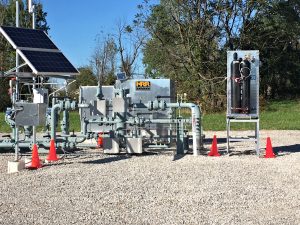Odor Fade – Why We Pickle Pipe
Why it is possible you MAY not smell gas?
In certain situations, the Mercaptan added (the sulfur or rotten egg smell) to natural gas supplies, maybe either filtered out or absorbed, leaving little to no odor in leaking or vented natural gas. Utility companies regularly conducts tests within their systems to ensure gas is delivered to customers that meet State and Federal odorization levels. However, once it leaves the distribution system, the odor may be stripped out from the natural gas. This phenomenon can become a safety hazard if personnel are purging new equipment or appliances into service or otherwise relying on their sense of smell to detect the presence of natural gas.
Definitions:
- Odor Fade: Loss of odorant so that it is no longer detectable.
- Purging: Removing air in a pipe and replacing it with natural gas
Some of the most common factors where odor fade may be experienced include large diameter, steel pipe with relatively low-flow conditions. While it is possible that smaller diameters and other materials may be impacted, most situations appear to involve larger commercial/industrial applications.
What might cause the smell to fade?
There are many factors that could impact gas odor.
- Some people may not be able to detect odorant because they have a diminished sense of smell (either permanent or temporary).
- Odor fatigue could occur when exposed to natural gas odor for an extended period of time.
- It could be masked by other strong odors in the area.
- Large diameter new pipe (more pronounced in steel pipe).
- Gas pressure, flow or lack of flow conditions
- Oxidation
- Absorption
- Moisture, rust or other contaminants in the piping system
- Piping configuration downstream of the meter
Could Odor fade impact outside gas leaks?
- Yes – soil or concrete could absorb odorant reducing the intensity.
- DO NOT RELY on Sense of Smell alone to detect natural gas.
Odor Fade Considerations for Designers, Contractors, Builders
What can you do to help prevent odor fade?
- Design piping systems for expected flow rate, try to avoid upsizing.
- Design piping systems in a loop that minimizes dead ends to keep gas flowing.
General Precautions:
- Always use gas detection equipment (combustible gas indicators) when purging or if natural gas may be leaking or venting.
- Do not purge natural gas into a confined space, vent it to the outdoors.
- When purging, make sure area is well ventilated.
- DO NOT RELY on Sense of Smell alone to detect natural gas.
- Follow local plumbing, mechanical or fuel gas codes during purging operations.
- Follow manufacturer’s instructions when installing appliances or other gas equipment
- Purging operations should only be done be licensed qualified professionals.
(The above information was shared from National Grid.)

 As the industry experts, MRR designs
As the industry experts, MRR designs 
